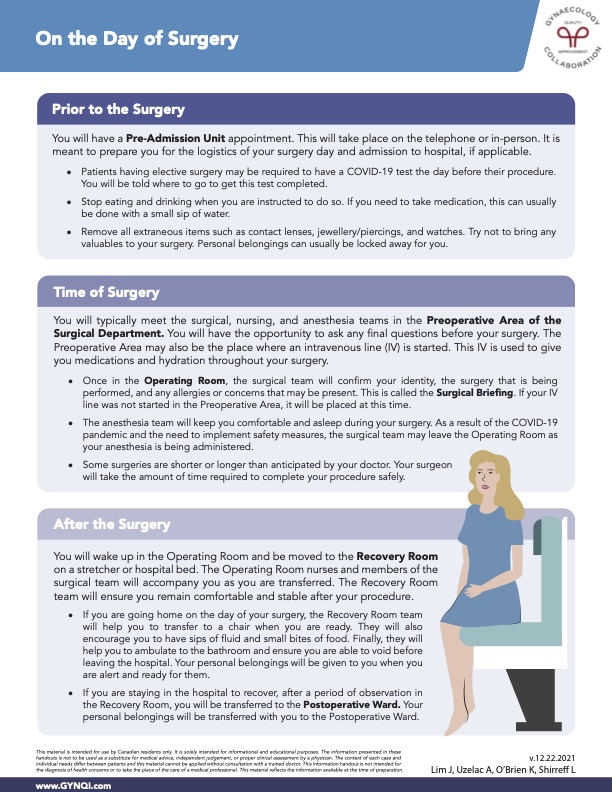
Summary:
- Attend your Pre-Admission Unit appointment to understand the logistics of your surgery day. Note any specific instructions regarding eating, drinking, and the removal of non-essential items, while also preparing for possible COVID-19 testing for elective surgeries.
- In the Preoperative Area, you’ll meet the surgical, nursing, and anesthesia teams, allowing you to ask any last-minute questions. Here, an intravenous (IV) line may be started for medications and hydration during the procedure.
- Upon entering the Operating Room, the surgical team will confirm your identity and procedure details during a Surgical Briefing. Anesthesia will be administered, and your surgeon will take the necessary time to complete the surgery safely.
- After your procedure, you will be taken to the Recovery Room, where the team will monitor your comfort and stability. If you’re going home the same day, they’ll assist you with fluid intake and bathroom needs before providing your personal belongings. If staying in the hospital, you will be transferred to the Postoperative Ward with your belongings.
Understanding what to expect during surgery is crucial for both mental and physical preparedness. Knowing the details of the surgical process can help alleviate anxiety, allowing you to focus on your recovery. Being informed about each step—from preoperative preparations to the recovery process—enables you to engage in constructive discussions with your healthcare provider, which not only fosters a sense of control in your health but also promotes trust in your medical team for a smoother surgical experience.
Prior to Your Surgery
To prepare you for the logistics of your surgery day and admission to the hospital, you will have a Pre-Admission Unit appointment either by telephone or in person.
Under the instruction of your healthcare team, there are a few things to keep in mind before your surgery.
This can include:
- Noting when you need to stop eating and drinking beforehand as per instructions. If needed, medication can usually be taken with a small sip of water.
- Removal of all non-essential items such as contact lenses, jewelry, piercings, and watches. While personal belongings can usually be locked away for you, it’s best not to bring any valuables to the hospital.
- Patients having elective surgery may be required to have a COVID-19 test the day before their procedure, you will be instructed where to go to get this test completed.
At the Time of Your Surgery
As you prepare for your surgery, you will typically meet the surgical, nursing, and anesthesia teams in the Preoperative Area of the Surgical Department, where you can ask any final questions or relay concerns to your team.
Here, you may have an intravenous line (IV) started for medications and hydration during the procedure.
What to Expect in the Operating Room
After the pre-surgery prep is complete, you’re ready to be brought into the Operating Room. Your team will have a few more things to do before starting the surgery.
Surgical Briefing: Once you’ve been brought into the operating room, the surgical team will confirm your identity, the surgery that is being performed, and if you have any allergies or final concerns.
IV Line: If your IV line was not started in the preoperative area, it will be placed at this time.
Anesthesia: The anesthesia team will keep you comfortable and asleep during your surgery. As a result of the COVID-19 pandemic and the need to implement safety measures, the surgical team may leave the operating room as your anesthesia is being administered.
Length of Surgery: Some surgeries are shorter or longer than originally anticipated by your doctor. Your surgeon will take the appropriate amount of time required to complete your procedure safely.
After Your Surgery
Once your surgery is complete, you will be transported to the Recovery Room, on either a stretcher or hospital bed. The operating room nurses and members of the surgical team will accompany you as you are transferred. The recovery room team will ensure you remain comfortable and stable after your procedure.
If you are going home on the day of your surgery, the recovery room team will help you navigate the following:
- Transferring to a chair when ready
- Encourage you to have sips of fluid and small bites of food
- Help you to move to the bathroom and ensure you are able to void before leaving the hospital
Your personal belongings will be given to you when you are alert and ready for them.
If you are staying in the hospital to recover, after a period of observation in the recovery room, you will be transferred to the Postoperative Ward.
Your personal belongings will be transferred with you to the postoperative ward.
Take Steps Toward a Smoother Surgery Process
Understanding what to expect during surgery is essential for your well-being. From preoperative preparations to recovery, you can take the correct steps toward a smoother surgery experience by being informed about the process.
By following instructions from your medical team and being prepared from start to finish, you can focus on your recovery, while your team gives you the best care. Be in control of your experience for a faster healing journey.



